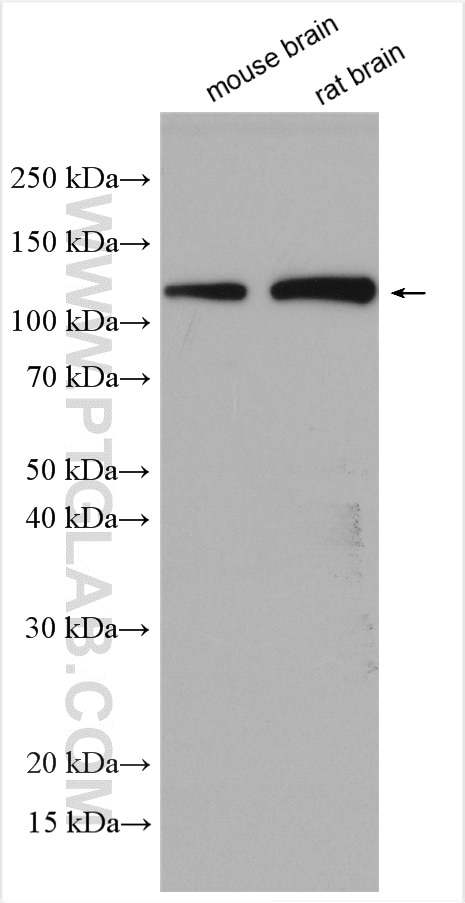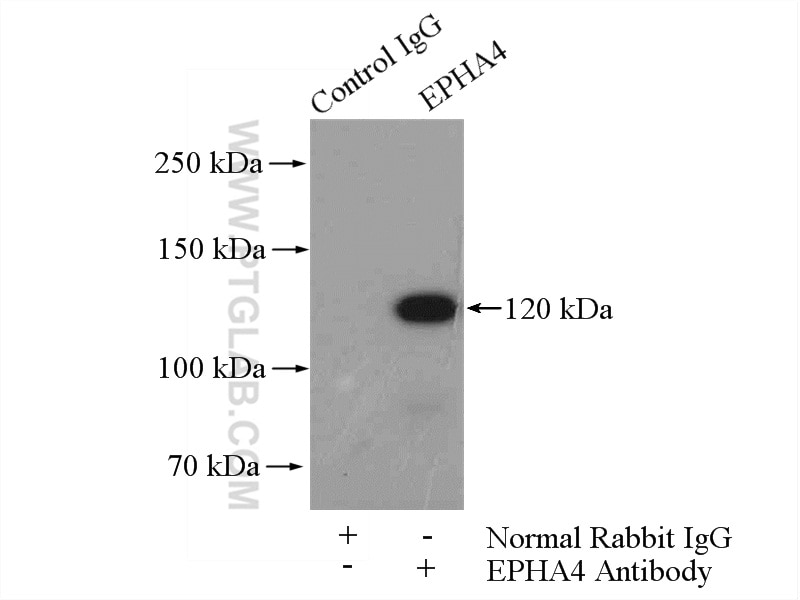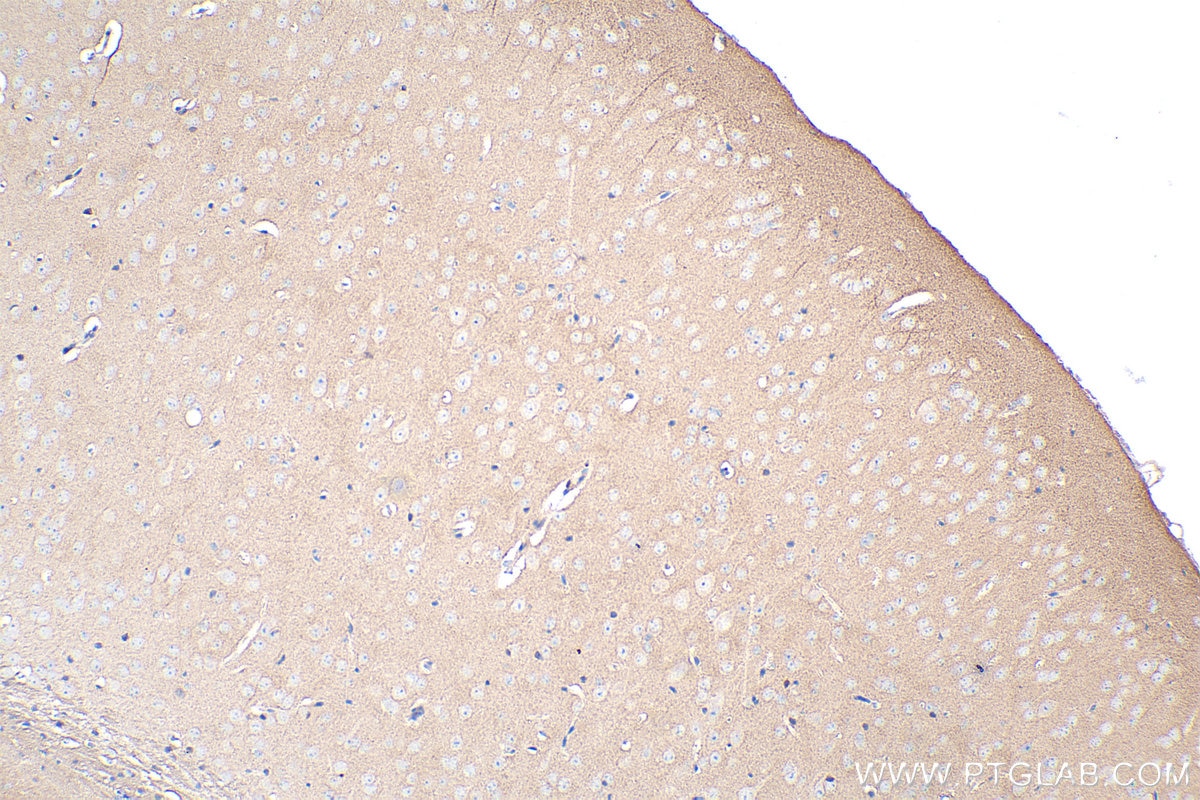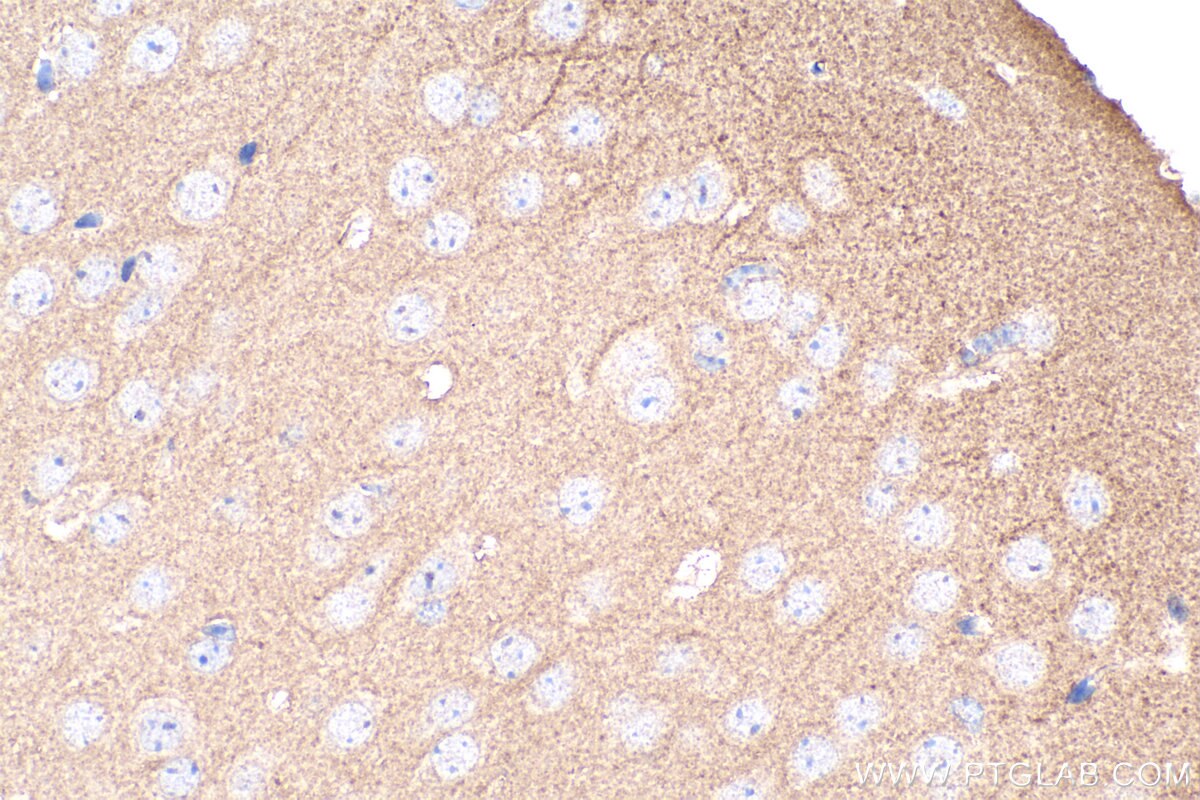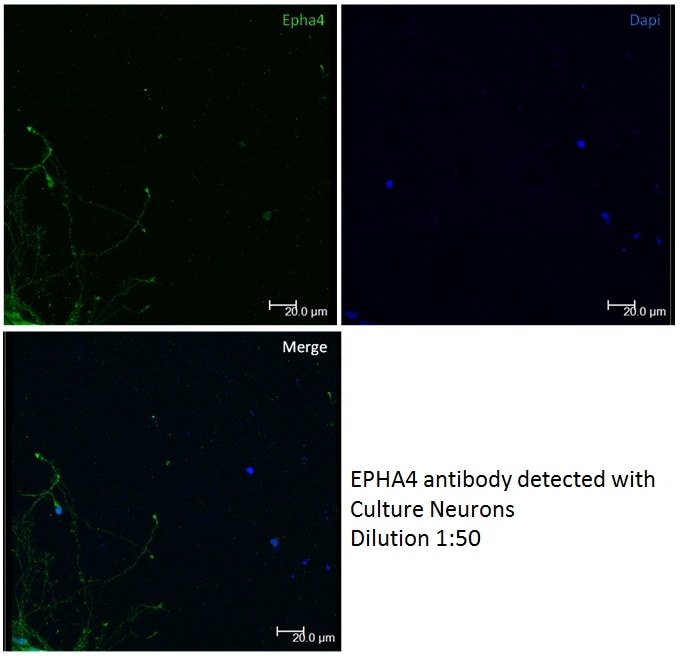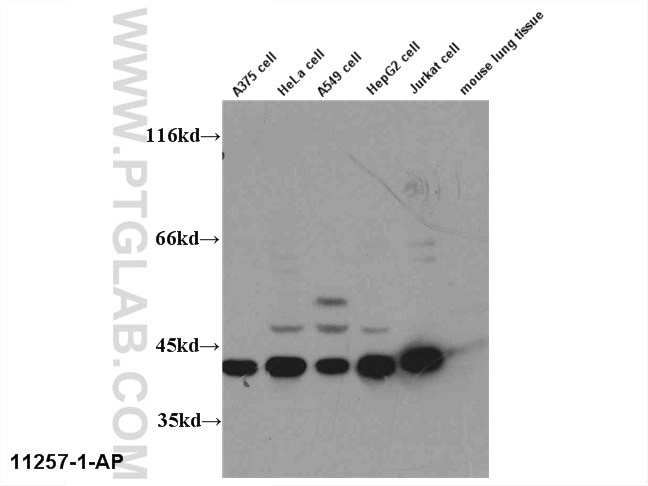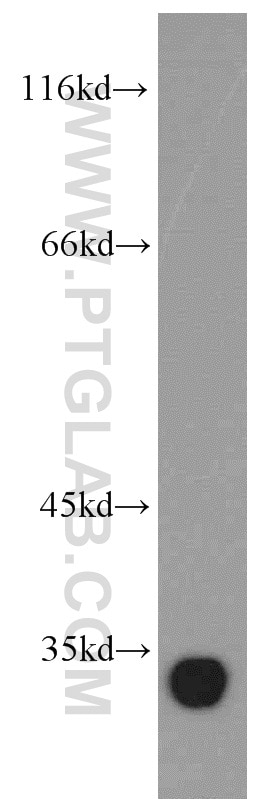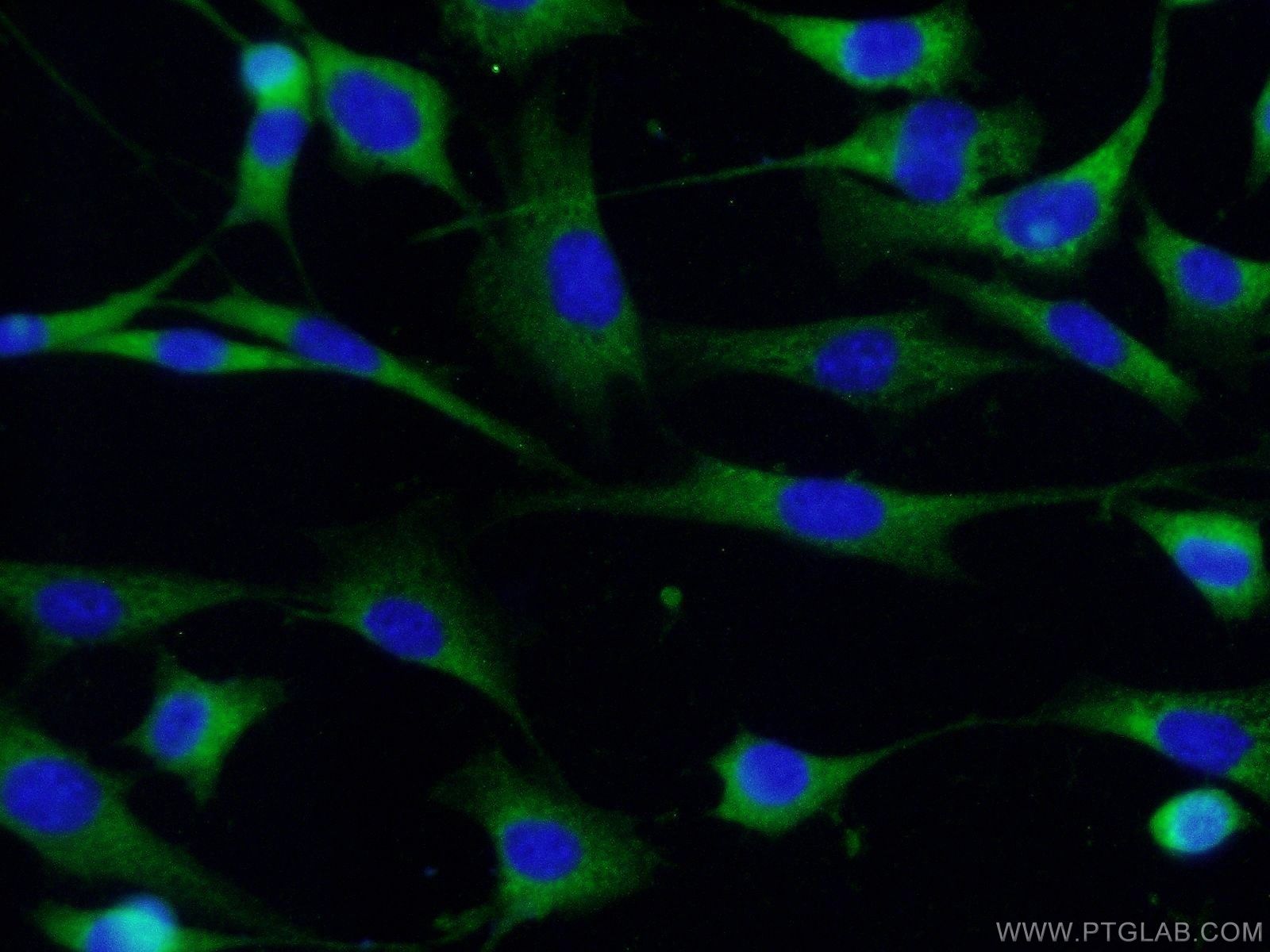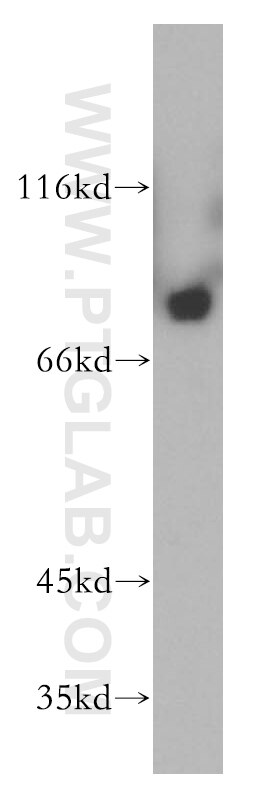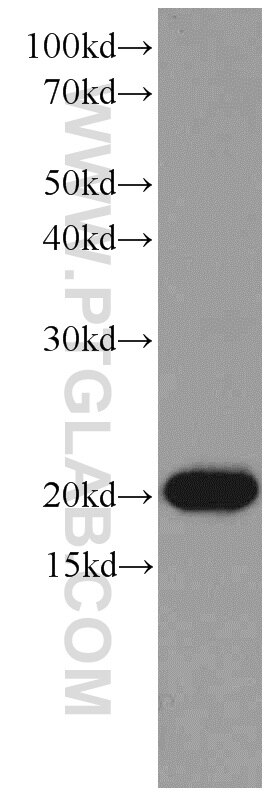- Phare
- Validé par KD/KO
Anticorps Polyclonal de lapin anti-EphA4
EphA4 Polyclonal Antibody for WB, IP, IF, IHC, ELISA
Hôte / Isotype
Lapin / IgG
Réactivité testée
Humain, rat, souris
Applications
WB, IHC, IF/ICC, IP, ELISA, Cell treatment
Conjugaison
Non conjugué
N° de cat : 21875-1-AP
Synonymes
Galerie de données de validation
Applications testées
| Résultats positifs en WB | tissu cérébral de souris, tissu cérébral de rat |
| Résultats positifs en IP | tissu cérébral de souris |
| Résultats positifs en IHC | tissu cérébral de souris, il est suggéré de démasquer l'antigène avec un tampon de TE buffer pH 9.0; (*) À défaut, 'le démasquage de l'antigène peut être 'effectué avec un tampon citrate pH 6,0. |
| Résultats positifs en IF/ICC | Cellules neuronales |
Dilution recommandée
| Application | Dilution |
|---|---|
| Western Blot (WB) | WB : 1:500-1:2000 |
| Immunoprécipitation (IP) | IP : 0.5-4.0 ug for 1.0-3.0 mg of total protein lysate |
| Immunohistochimie (IHC) | IHC : 1:1000-1:4000 |
| Immunofluorescence (IF)/ICC | IF/ICC : 1:50-1:500 |
| It is recommended that this reagent should be titrated in each testing system to obtain optimal results. | |
| Sample-dependent, check data in validation data gallery | |
Applications publiées
| KD/KO | See 1 publications below |
| WB | See 4 publications below |
| IHC | See 2 publications below |
| IF | See 2 publications below |
| FC | See 2 publications below |
Informations sur le produit
21875-1-AP cible EphA4 dans les applications de WB, IHC, IF/ICC, IP, ELISA, Cell treatment et montre une réactivité avec des échantillons Humain, rat, souris
| Réactivité | Humain, rat, souris |
| Réactivité citée | rat, Humain, souris |
| Hôte / Isotype | Lapin / IgG |
| Clonalité | Polyclonal |
| Type | Anticorps |
| Immunogène | EphA4 Protéine recombinante Ag16233 |
| Nom complet | EPH receptor A4 |
| Masse moléculaire calculée | 986 aa, 110 kDa |
| Poids moléculaire observé | 120 kDa |
| Numéro d’acquisition GenBank | BC026327 |
| Symbole du gène | EPHA4 |
| Identification du gène (NCBI) | 2043 |
| Conjugaison | Non conjugué |
| Forme | Liquide |
| Méthode de purification | Purification par affinité contre l'antigène |
| Tampon de stockage | PBS avec azoture de sodium à 0,02 % et glycérol à 50 % pH 7,3 |
| Conditions de stockage | Stocker à -20°C. Stable pendant un an après l'expédition. L'aliquotage n'est pas nécessaire pour le stockage à -20oC Les 20ul contiennent 0,1% de BSA. |
Informations générales
EphA4 is a member of the Eph receptor tyrosine kinase family and has important functions in the developing and adult nervous system (PMID: 14697664). The Eph receptors comprise a large family of closely related transmembrane tyrosine kinases that actively signal when bound to their ephrin ligands. The Eph receptors are characterized by an extracellular region with a unique cysteine-rich motif extending over its amino-terminal half, followed by two fibronectin type III motifs (PMID: 9530499). They are divided into two sub-groups (EphA and EphB) based on the similarity of their extracellular domain sequences and their affinities for binding ephrin-A and ephrin-B ligands (PMID: 11114742). EphA4 is involved in commissure formation within the forebrain, axonal guidance in the corticospinal tract, regulation of the central pattern generator that provides normal locomotor function and axonal regeneration following spinal cord injury (PMID: 30061574). EphA4 has been implicated as a disease modifier of amyotrophic lateral sclerosis (ALS) (PMID: 22922411).
Protocole
| Product Specific Protocols | |
|---|---|
| WB protocol for EphA4 antibody 21875-1-AP | Download protocol |
| IHC protocol for EphA4 antibody 21875-1-AP | Download protocol |
| IP protocol for EphA4 antibody 21875-1-AP | Download protocol |
| Standard Protocols | |
|---|---|
| Click here to view our Standard Protocols |
Publications
| Species | Application | Title |
|---|---|---|
Nat Commun EphB4 and ephrinB2 act in opposition in the head and neck tumor microenvironment. | ||
Proc Natl Acad Sci U S A Endothelial deletion of EPH receptor A4 alters single-cell profile and Tie2/Akap12 signaling to preserve blood-brain barrier integrity | ||
Biochem Biophys Res Commun Single-chain fragment antibody disrupting the EphA4 function as a therapeutic drug for gastric cancer | ||
Brain Res Bull Electroacupuncture ameliorates chronic unpredictable mild stress-induced depression-like behavior and cognitive impairment through suppressing oxidative stress and neuroinflammation in rats | ||
bioRxiv Identification of new ciliary signaling pathways in the brain and insights into neurological disorders | ||
JCI Insight Monocyte pro-inflammatory phenotypic control by Ephrin type-A receptor 4 mediates neural tissue damage. |
